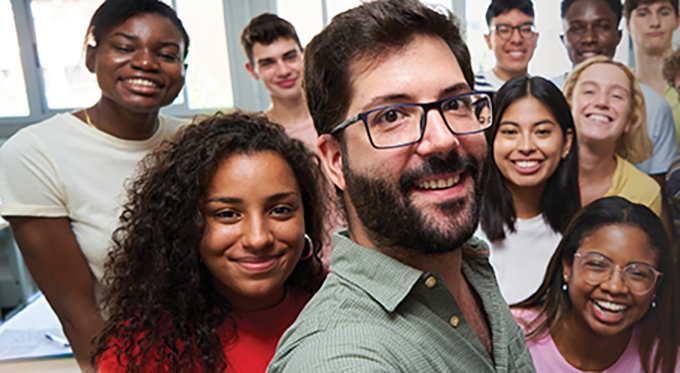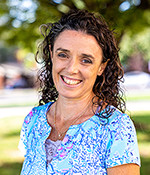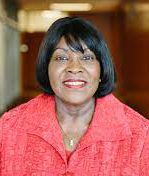 As we enter the final few weeks of the submissions period for the International Literacy Association’s (ILA) awards and grants program, we’re taking a look back at some of our past recipients and their significant contributions to literacy teaching and research.
As we enter the final few weeks of the submissions period for the International Literacy Association’s (ILA) awards and grants program, we’re taking a look back at some of our past recipients and their significant contributions to literacy teaching and research.
Below, in Part I of our series, we delve into the experiences of some remarkable individuals. Each interview provides valuable insights into the impact of being recognized, how grant recipients used their funding, and why they believe initiatives like ILA’s awards program are vital for moving the field of literacy forward.
After reading, don’t forget to follow their advice: Submit a nomination for yourself or a colleague by March 15. There are awards for students, educators, and scholars, and funding opportunities for research that you won’t want to miss.
 Sarah Lupo
Sarah Lupo
Associate Professor of Literacy Education, James Madison University
Timothy & Cynthia Shanahan Outstanding Dissertation Award, 2018 Finalist
Steven A. Stahl Research Grant, 2016
How did receiving an award from ILA impact you both personally and professionally?
For the grant, it gave me funds to do a much more rigorous dissertation than I would have been able to do without funding. For both awards, it confirmed that the work I was doing was relevant to the field of literacy and gave me motivation to keep on with my research. I also really enjoyed participating in the poster session for Outstanding Dissertation finalists at the ILA annual conference. I met some great people who were at a similar place in their careers to me and learned a lot.
Can you share a specific project or initiative that was made possible through the support of the award/grant, and how it has contributed to advancing literacy education?
For the grant I received, I was able to complete my dissertation, which explored whether matching ninth graders with texts at their level (using Newsela texts) helped their comprehension. It did not! Although null findings, this was an important finding for the field because many teachers are relying on text algorithm tools like Newsela to differentiate, rather than looking for ways to support readers in reading more difficult texts which, this study as well as others, has shown to be more effective in increasing literacy skills for adolescents. I was able to publish the findings eventually in Reading Research Quarterly five years ago and this piece has now been cited 53 times. A practitioner version of this (“Struggle is Not a Bad Word”) was published in the Journal of Adolescent & Adult Literacy and has been cited 29 times. This study was only possible because of the grant I received from ILA.
How do you believe ILA’s awards and grants program contributes to raising awareness about the importance of literacy and its impact on individuals and communities?
I think it helps show people where the pulse is for literacy research in our field. I have served on one of the awards committees since then and I always love seeing what folks are working on.
For educators and researchers considering applying for the current awards and grants submissions period, what advice or insights would you offer based on your experience?
I’d say go for it! I was pretty unsure I would receive either of these awards, but it worked out. Reach out to your mentors and ask them to review your work and talk to as many people as you can. It’s worth it!
 Patricia A. Edwards
Patricia A. Edwards
University Distinguished Professor, Michigan State University
Jerry Johns Outstanding Teacher Educator in Reading Award, 2014
Elva Knight Research Grant, 1995
How did receiving an award from the ILA impact you both personally and professionally?
Receiving the Elva Knight Research Grant for my project titled “Examining Dialogues Used in Facilitating Parental Understanding of First Graders’ Reading, Writing, and Development” has been an immensely rewarding experience both personally and professionally. First and foremost, the recognition of my project as promising research that addresses significant questions within the discipline of reading/literacy research and practice filled me with a sense of validation and accomplishment. It was truly an honor to have my work acknowledged in this way.
Professionally, receiving this award opened doors for me to make meaningful contributions to the field. Presenting my findings at the IRA annual meeting and the Michigan Reading Association not only allowed me to share my research with fellow educators and researchers but also provided a platform to engage in fruitful discussions and exchange ideas. Moreover, being recognized with the Elva Knight Research Grant has increased my visibility and credibility within the reading/literacy research community, affording me the opportunity to further contribute to the advancement of the field.
Can you share a specific project or initiative that was made possible through the support of the award/grant, and how it has contributed to advancing literacy education?
The Elva Knight Research Grant proved to be a pivotal moment in my academic journey. This grant not only provided the necessary support to conduct my research but also opened doors to further opportunities in advancing literacy education. In particular, the insights gained from the Elva Knight Research Grant led to the receipt of a small Spencer Grant, which empowered me to author the 1999 Heinemann book titled A Path to Follow: Learning to Listen to Parents. Remarkably, this book has since reached a wide audience, with sales exceeding 50,000 copies. Reflecting on these achievements, it is evident that the Elva Research Grant has played a crucial role in my contributions to advancing literacy education, underscoring its significance in shaping my professional trajectory.
Looking back, how has the recognition and support from ILA motivated you to continue your efforts in advancing literacy, and what future goals do you have in this regard?
The recognition and support from ILA served as a significant catalyst in my writing journey. Motivated by this encouragement, I have authored several books aimed at empowering educators and fostering family involvement in student achievement. Among these publications are Tapping the Potential of Parents: A Strategic Guide to Boosting Student Achievement Through Family Involvement (Scholastic), Children’s Literacy Development: Making It Happen Through School, Family, and Community Involvement (Pearson), and New Ways to Engage Parents: Strategies and Tools for Teachers and Leaders (Teachers College Press), the latter of which was honored with the 2017 Delta Kappa Gamma Educators Book Award.
In addition, my 2019 release from Teachers College Press, Partnering With Families for Student Success: 24 Scenarios for Problem Solving With Parents, was recommended for the 2021 AACTE Outstanding Book Award. This book aims to equip teachers with the skills to effectively collaborate with caregivers from diverse linguistic, cultural, racial, and social backgrounds. Furthermore, my latest work, Teaching With Literacy Programs: Equitable Instruction for All (Harvard Education Press), underscores the premise that while core literacy programs offer valuable starting points aligned with current research and standards, they are inherently limited. Through this book, I endeavor to empower educators with equitable instructional strategies to meet the diverse needs of all learners.
Have there been any unexpected benefits or outcomes as a result of receiving the award/grant that you didn’t anticipate?
Receiving the award/grant has led to several unexpected benefits and outcomes that I could not have foreseen. For instance, in 2006, I was honored to be named the first African American president of the National Reading Conference, later renamed the Literacy Research Association (LRA). This position not only provided me with a platform to advocate for literacy education but also paved the way for me to become president of the International Reading Association (now ILA) in 2010, further expanding my influence in the field.
Another unexpected outcome occurred in 2012 when I was inducted into the Reading Hall of Fame. This recognition was particularly meaningful as I became one of the few African American women to receive this esteemed accolade, highlighting the significance of diversity in literacy research and practice.
In 2019, I was humbled to receive the Scholars of Color Distinguished Career Contribution Award at the American Educational Research Association (AERA) conference. This honor underscored the impact of my work in education and reinforced my commitment to advancing equity and inclusion in academic spaces.
Additionally, in 2020, I had the honor of being named the first African American recipient of the Oscar S. Causey Award from LRA, recognized as the pinnacle of achievement in reading research. This unexpected distinction not only affirmed the significance of my contributions to the field but also underscored the vital role of representation and diversity in academia. Furthermore, in 2022, I was chosen to be featured in The HistoryMakers, a digital archive documenting the Black experience in the United States, further highlighting the importance of diverse voices in shaping our collective narrative.
 Stephanie F. Reid
Stephanie F. Reid
Assistant Professor of Literacy Education, University of Cincinnati
Helen M. Robinson Grant, 2019
How did receiving a grant from the ILA impact you both personally and professionally?
Receiving the Helen M. Robinson Grant in 2019 was an honor. I felt validated in my work with teachers and students in middle school contexts and was grateful for the funding support for my dissertation work. At that time, my identity as a scholar and researcher felt very new. I had taught middle schoolers language arts and reading for many years, so stepping into my doctoral program was a significant life change for me. Earning recognition through ILA’s Helen M. Robinson Grant helped affirm my decision to move in this new professional direction and offered me the opportunity to speak to the significance of my scholarship on multimodal approaches to literacy education.
Can you share a specific project or initiative that was made possible through the support of the grant, and how it has contributed to advancing literacy education?
The Helen M. Robinson Grant supported my research in a seventh-grade language arts classroom. With the classroom teacher, I codesigned an eight-week curriculum unit that invited students to read and compose multimodal texts. Findings from this study have been shared through numerous articles, book chapters, and presentations. When possible, I coauthored and copresented with Justin Scholes, the teacher who welcomed me into his classroom community. In this moment, when so much attention is focused on decoding written language, this study is a reminder that words are not the only ways people communicate and connect with each other. The ability to make meaning with images and other modes matters, too. The importance of making, comprehending, and critiquing the kinds of multimodal texts that saturate students’ social worlds must not be lost in current conversations about what counts as reading and writing in schools.
Looking back, how has the recognition and support from ILA motivated you to continue your efforts in advancing literacy, and what future goals do you have in this regard?
Today, I continue to build upon the research that the Helen M. Robinson Grant supported. I have continued to explore how multimodal literacy approaches might be enacted in classrooms where students have time and agency to read and compose multimodal texts. Most recently, I worked with an eighth-grade teacher, Rita Thorson, who made curricular space for students to compose accounts of their pandemic lives. I hope to continue to showcase students’ reading and writing, illuminating their brilliance and sharing their perspectives on school literacy practices. I also hope to continue exploring how multimodal literacies intersect with other disciplines—art education and special education, for example. I am constantly looking for ways to evolve and share my understanding of what it means to be a reader, writer, speaker, listener, viewer, and thinker in these current times.
For educators and researchers considering applying for the current awards and grants submissions period, what advice or insights would you offer based on your experience?
I felt that one of the most important outcomes of the grant writing process was the clarity I gained through writing the proposal. The proposal format encourages a succinct and streamlined account of the research questions, relevant literature, and study procedures. Most important for me, the application also invited me to think about the significance of my scholarship and state clearly the impact I hoped to make. I have been an educator for nearly 25 years. Keeping sight of my “why” continues to fuel my lifelong investment in literacy education.
 Jungmin Kwon
Jungmin Kwon
Assistant Professor of Language and Literacy, Michigan State University
Helen M. Robinson Grant, 2018
Can you share a specific project or initiative that was made possible through the support of the grant, and how it has contributed to advancing literacy education?
I received the Helen M. Robinson Grant in 2018, which supports doctoral students in the early stages of their dissertations in the area of reading and literacy. My dissertation project focused on the language and literacy experiences of immigrant children and families in the context of transnational migration. Taking a multi-sited ethnographic approach, I documented immigrant children’s literacy experiences by observing their experiences in various settings, such as homes, schools, playgrounds, grocery stores, and museums across countries. I also employed what I call child-centered interview activities, during which I used mapping, drawing, and photo-elicitation interviews as a way to explore the children’s transnational and multilingual experiences and to center their voices through a multimodal approach. After finishing my dissertation, I turned this project into a book, which is entitled Understanding the Transnational Lives and Literacies of Immigrant Children (Teachers College Press).
Receiving the recognition and support from ILA for my work meant a lot to me as a doctoral student. This grant award reaffirmed my dedication to working with immigrant children and amplifying their voices, and it has motivated me to continue the work that can contribute to expanding the notion of literacy and understanding of immigrant children and families.
Stay tuned for Part II of our series next week!